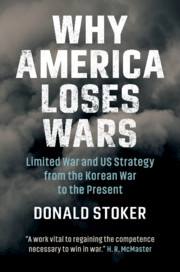Book contents
- Why America Loses Wars
- Why America Loses Wars
- Copyright page
- Dedication
- Contents
- 1 Are We at War? What Do We Want? And Do We Want to Win?
- 2 The Way We Think about War (Particularly Limited War) Is Broken: Here Is How We Fix It
- 3 The Political Objective: Why Nations Fight (Limited) Wars
- 4 Constraints: Or Why Wars for Limited Aims are So Difficult
- 5 Strategy: How to Think about Fighting for a Limited Political Objective
- 6 And You Thought the War Was Hard: Ending the War and Securing the Peace
- Conclusion: Is History Rhyming?
- Acknowledgments
- Notes
- Bibliography
- Index
5 - Strategy: How to Think about Fighting for a Limited Political Objective
Published online by Cambridge University Press: 09 August 2019
- Why America Loses Wars
- Why America Loses Wars
- Copyright page
- Dedication
- Contents
- 1 Are We at War? What Do We Want? And Do We Want to Win?
- 2 The Way We Think about War (Particularly Limited War) Is Broken: Here Is How We Fix It
- 3 The Political Objective: Why Nations Fight (Limited) Wars
- 4 Constraints: Or Why Wars for Limited Aims are So Difficult
- 5 Strategy: How to Think about Fighting for a Limited Political Objective
- 6 And You Thought the War Was Hard: Ending the War and Securing the Peace
- Conclusion: Is History Rhyming?
- Acknowledgments
- Notes
- Bibliography
- Index
Summary
It is critical to understand how to use military force to achieve the political aim sought. This requires conducting a rational assessment of the situation, developing a strategy or plan for getting there, and determining the means required for fulfilling the plan and achieving the political aim. Critically, one of the worst failures of previous limited war is thinking that the forces must be “limited” because the political objective is. This is a fallacy. One can use overwhelming force in a war fought for a limited political aim. One should – at the least –
Keywords
- Type
- Chapter
- Information
- Why America Loses WarsLimited War and US Strategy from the Korean War to the Present, pp. 121 - 171Publisher: Cambridge University PressPrint publication year: 2019

